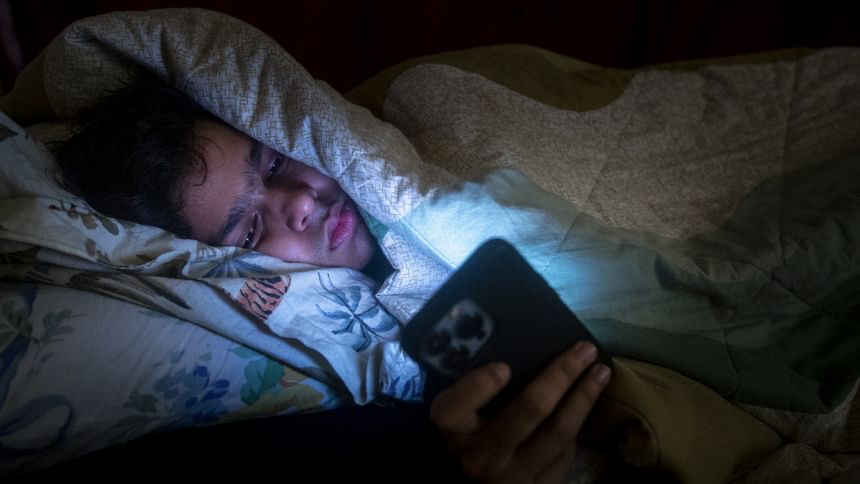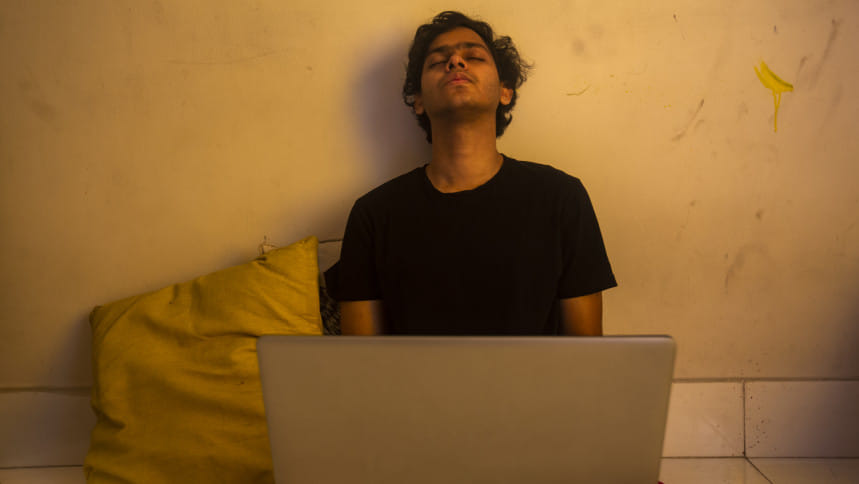There is no tradeoff between sleep and productivity

We treat some of the best things that life has to offer unfairly. The saddest example of that is how we neglect our need for sleep. In an online survey conducted by SHOUT, out of 250 respondents with ages ranging from 14 to 33, 64 percent reported to getting less than six hours of sleep at night. The most common sleep routine for young people is bedtime after 2 AM, but waking up before 9 AM to attend class.
But why would we do this to ourselves? You'd think no one would want to voluntarily forego something as fun as sleep, right? Whilst there are other reasons why we stay awake at night, a large factor is the cultural belief that sleep and productivity are mutually exclusive.
The first time a lot of us witness negative connotations around sleep, unfortunately, comes from parents or older family members. The idea that sleep is a 'lazy activity' is prevalent among Bangladeshi elders. A lot of them are ignorant of the repercussions of not getting adequate sleep, which is more severe and damaging for children and adolescents. However, too many of us grow up hearing variations of things like sleep is a luxury or indulgence instead of a necessity, sleeping 'too much' makes us fat, or having any and all failures we face being blamed on the fact that we often commit the crime of getting the sleep that we need.

A recent phenomenon worsening this problem is the onset and spread of "hustle culture", which, alongside other equally regrettable practices, glorifies sleeplessness. This often consists of things like motivational speakers of doubtful credibility assertively and aggressively claiming that the most successful people walking the earth sleep no more than 4 hours a night.
All of these factors combined with the fact that it's just easy to sacrifice sleep.
When asked about her sleeping habits, Progga Parmita Rupkotha, a twelfth grader at Scholastica school, shared, "I usually sleep about 4 hours a night, it does make it hard to focus at morning classes. I am drowsy and tired throughout the day, but as nighttime comes, I feel more productive, and delay sleep by thinking that I'll go to sleep as soon as the task at hand is completed. Then I pick up something else."
In the short-term, procrastinating during the day and running on adrenaline at night to cram for the exam the next day works. Eventually, this becomes a habit, and we find ourselves saying things like "a few all-nighters and I'll have this covered".
It's long overdue for us to understand that sleep is not lost time, nor is it a way for us to rest after we have done our work. Proper sleep is what makes academics, work, and life easier, better, and faster.
Let's break this down with an example of a familiar scenario. You have an exam the next day, and regardless of your level of preparation, you believe sacrificing your sleep to study the remaining formulas, or revise a bit more, will result in a proportional increase in your score.
Academic performance relies most heavily on memory and processing information. Sleep plays an integral role in making both of these things work. Nineteenth century psychologist Hermann Ebbinghaus demonstrated that 40 percent of new information is forgotten within the first 20 minutes, a phenomenon known as the forgetting curve. This loss can be prevented through memory consolidation, the process by which short-term memory is transferred to long-term memory.
Different stages of sleep help to consolidate different types of memory.
The two deepest stages of sleep are Slow Wave Sleep and Rapid Eye Movement (REM) sleep. During Slow Wave Sleep, declarative short-term memory (outright information, such as mathematical formulas) is repeatedly reactivated, which redistributes it to long-term storage.

REM sleep helps the consolidation of procedural memory, which is knowledge of how to perform a particular type of task, such as the skill of working through a math problem.
Loss of sleep also lowers your attention span, impairs your decision making, creativity, and sequential thinking.
And thus, when you sit for your exam sleep deprived, not only will you feel tired, groggy, and unable to focus throughout the exam duration, you will likely have forgotten most of the content you've studied throughout the night, and struggle to analyse and form links between the little information you recall while writing answers.
This is just an example of short-term harms to your productivity. Regularly going short on sleep can harm your health in ways that can cause you to be unfocused during work or classes, or make you ill enough to not be able to show up.
Losing sleep may cause inflammation, hallucination, high blood pressure, and has also been linked to diabetes and obesity. Chronically sleeping fewer than 6 hours a night increases stroke risk by four and a half times.
Sleeplessness can cause such immense suffering due to the accumulation of waste products in our brain, which are usually the byproducts of chemical reactions which break down energy sources.
The glymphatic system, a cleanup system to clear out this build up is much more active when we sleep.
One can hardly be expected to perform at their peak with a headful of waste, am I right?
If you're a person whose brain processes numbers well, some statistics might convince you. A Harvard research study, conducted in 2015, found that for the average American worker, insomnia leads to the loss of 11.3 days' worth of productivity each calendar year. That's the equivalent of USD 2,280.
In the words of Yahia Md Amin, chairman and lead psychologist of Lifespring Healthcare Centre, "If professionals stay up late to supposedly 'get more done', they are actually trading perceived short-term productivity gains for actual long-term productivity losses."
According to Yahia Md Amin, maintaining good sleep routine is one of the safest investments and also has the highest returns.
A widespread dilemma amongst the youth is whether sleeping the recommended amount whenever is good enough, or if when you sleep matters too.
According to Dr. Syedul Ashraf Kushal, CEO and lead psychiatrist at Lifespring, it does. "Sleep between 9 PM and 4 AM ensures that you are getting the best quality of sleep. This is the time when you have the most amount of melatonin, the sleep hormone, in your body. To ensure quality sleep, I advise young people to complete all heavy meals at least 2 hours before bed, and try to reduce screen time."
Among young people, poor sleeping habits are so normalised, that a lot of us never seem to realise that we are not performing as well as we could. Being sleep deprived is all we've ever known.

Turjo Babus Salam, currently working as a junior river engineer at Institue of Water Modeling, had flipped his sleep schedule and is enjoying enhanced productivity, "Back in university, I used to stay up until 3 or 4 am to finish my assignments. I would be sleepy and couldn't really concentrate fully."
But after joining work, he has to wake up early in the morning, and fell into the routine of going to bed by 12 am.
"I realised that back then, no matter how long I slept in, it was never enough. Also, now I have more of the day to work with, during which I can work with full concentration and don't feel as tired when I do so," he added, when asked how this change had affected his life.
However, not all problems can be fixed with willpower. If you are unable to sleep at night for prolonged periods regardless of what wellness measures you take, Dr. Kushal recommends getting tested for sleep disorders.
Sleep is glorious, it refreshes us, allows us a temporary break from this fast-paced, hectic madness, and lets us embark into the land of dreams where anything is possible. Not only is the experience of sleep beautiful in and of itself, but it also makes the hours you don't spend sleeping happier and easier.
The next time you're tempted to forego sleep to chase the sense of accomplishment of using that time to do more work, remember that you can't be productive if you are incapacitated physically, or mentally.
Amrin's confusion is at its peak, she's been screaming internally for a while now. Send help at [email protected]

 For all latest news, follow The Daily Star's Google News channel.
For all latest news, follow The Daily Star's Google News channel. 








Comments